|
|
|
|
|
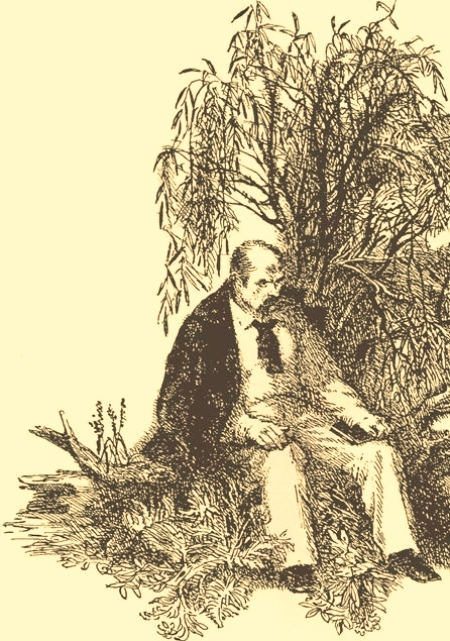 Poem of Taras Shevchenko "Katerina" ("Kateryna") in English, translated by John Weir and Mary Skrypnyk Poem of Taras Shevchenko "Katerina" ("Kateryna") in English, translated by John Weir and Mary Skrypnyk
...and other...
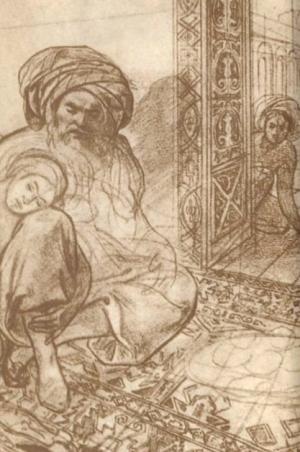 Taras Shevchenko Taras Shevchenko
"Hamaliya" / "Oh, the winds are mute, the tides do not carry"
("Гамалія" / "Ой нема, нема ні вітру, ні хвилі")
[October - first half of November, 1842]
Translated by John Weir
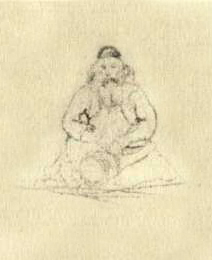 Taras Shevchenko Taras Shevchenko
"Perebendya"
("Перебендя")
1839, St.-Petersburg
(Санкт-Петербург)
Translated by John Weir
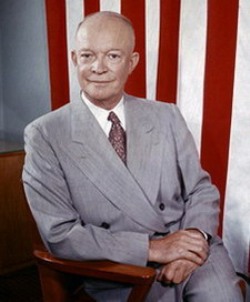 "On September 13, 1960, when I signed into law a measure to authorize the erection of this statue, it was my expectation that you would arrange a ceremony of dedication commensurate with the greatness of Taras Shevchenko..." (Dwight David Eisenhower) "On September 13, 1960, when I signed into law a measure to authorize the erection of this statue, it was my expectation that you would arrange a ceremony of dedication commensurate with the greatness of Taras Shevchenko..." (Dwight David Eisenhower)
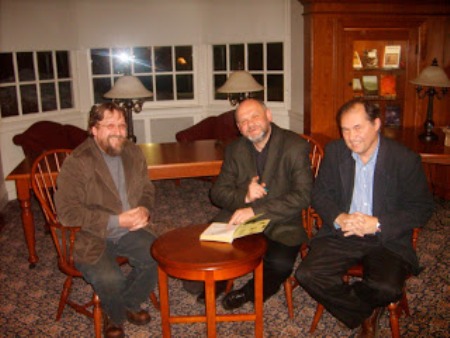
Read an interesting interview with Michael Naydan.
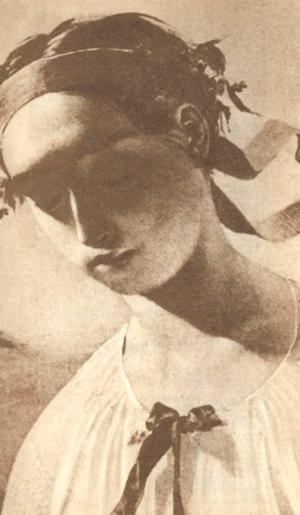 Taras Shevchenko Taras Shevchenko
"Катерина", поема / "Кохайтеся, чорнобриві"
"Kateryna", poema / "Kokhaytesya, chornobryvi"
St. Petersburg, 1838
Translated by John Weir
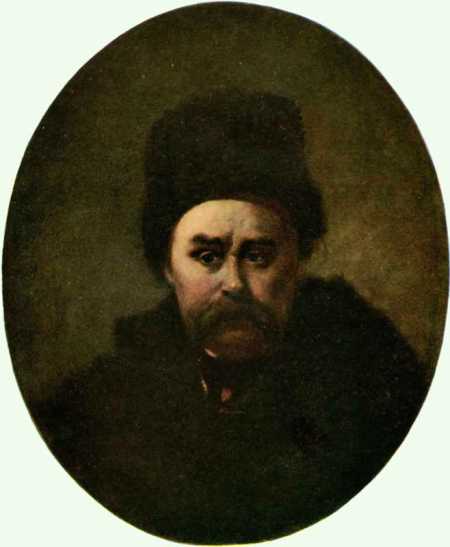
Taras Shevchenko,
"Self-portrait, 1861"His final weeks, when he was almost completely bed-ridden, were occupied with plans for distributing his Bukvar and for arranging for the proceeds from its sales to be transmitted for the support of Sunday schools which were then being established in the villages for the general education of both children and adults. Even on his death bed he was still dreaming of a cottage overlooking the Dnieper, and sent instructions to Vartolomiy to forget the sites then under consideration and to try to buy him a patch of land on an elevated location near the town of Kaniv, as if he had foreseen that that would be his final resting place. In his last poem, written with a trembling hand two weeks before his death, he addressed his Muse and prepared for the long journey with her to the nether world where, on the banks of the Styx he would finally build himself a dwelling and live there with her as his wife. His earthly course almost over, there remained nothing for him but to suffer and wait for the inevitable end, which came on February 26, 1861, one day after his forty-seventh birthday. He would have been overjoyed, if he had lived a week longer, to hear the proclamation announcing the abolition of serfdom in the Russian Empire.
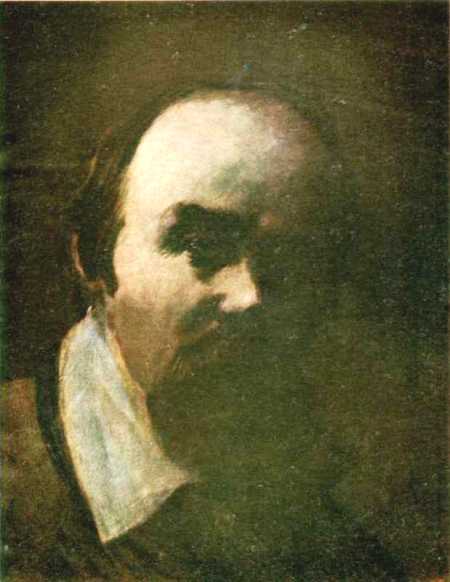 Taras Shevchenko,
Taras Shevchenko,
"Self-portrait, 1859"
In June 1859, he again found himself on Ukrainian soil, visiting the villages where he was born and brought up and spending leisurely days at the homes and estates of his friends scattered about the province of Kiev. Particularly tender was his meeting with his sister Yarina in the village of Kirilivka and with his sister-in-law’s brother, Vartolomiy, a steward on the estate of a Ukrainian landlord in the vicinity of Korsun.
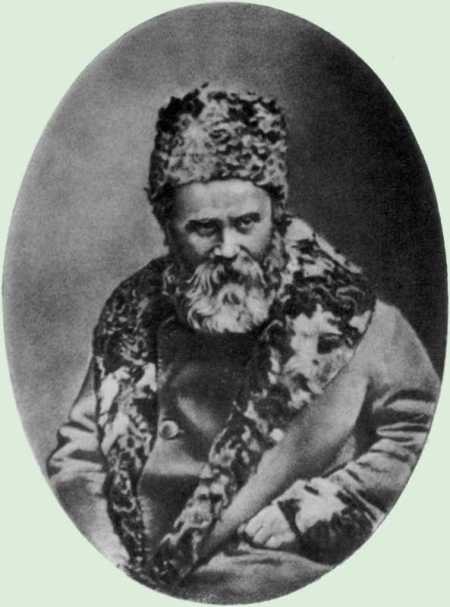 Taras Shevchenko,
Taras Shevchenko,
"Self-portrait,1858"Having returned to St. Petersburg, his first visits were to his closest friends, M. Lazarevsky and the Tolstoys, who were more instrumental than anyone else in helping him regain his freedom. His arrival at the Russian capital was a social event of the first order, and he was wined, dined, and lionized even to surfeit. In addition, he plunged himself into the cultural and artistic life of that imperial city with as much gusto as if he wanted to make up in a few days for the lack of it he had experienced for ten years.
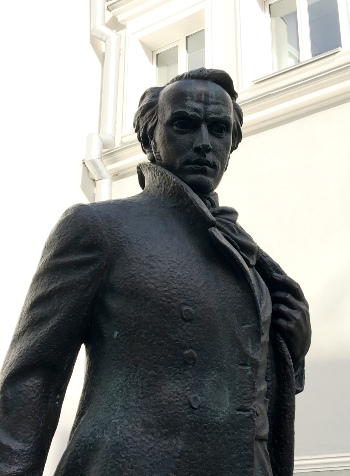 The Taras Shevchenko Museum is located in Shevchenko’s beloved Kyiv in a mansion formerly owned by a wealthy sugar magnate. This juxtaposition of housing the most comprehensive collection of artifacts, paintings and memorabilia from Shevchenko’s life, surrounded by such opulence is ironic and poignant. For Ukrainians, Shevchenko is the premiere national hero. Son of a serf, at once a novelist and a painter, a poet and a prisoner, Shevchenko was a celebrity and political figure, who finally returned home to the area near the town of Kaniv, to be buried after his death. To a new generation of Ukrainians, those born after the Soviet era, raised with a unique identity, and who came of age in the era of EuroMaidan, Shevchenko’s dream of Ukrainian freedom resonates with renewed vigor. The museum provides an opportunity for foreigners and natives alike to make his acquaintance and to draw lessons from his writings on the past and future of Ukraine. The Taras Shevchenko Museum is located in Shevchenko’s beloved Kyiv in a mansion formerly owned by a wealthy sugar magnate. This juxtaposition of housing the most comprehensive collection of artifacts, paintings and memorabilia from Shevchenko’s life, surrounded by such opulence is ironic and poignant. For Ukrainians, Shevchenko is the premiere national hero. Son of a serf, at once a novelist and a painter, a poet and a prisoner, Shevchenko was a celebrity and political figure, who finally returned home to the area near the town of Kaniv, to be buried after his death. To a new generation of Ukrainians, those born after the Soviet era, raised with a unique identity, and who came of age in the era of EuroMaidan, Shevchenko’s dream of Ukrainian freedom resonates with renewed vigor. The museum provides an opportunity for foreigners and natives alike to make his acquaintance and to draw lessons from his writings on the past and future of Ukraine.
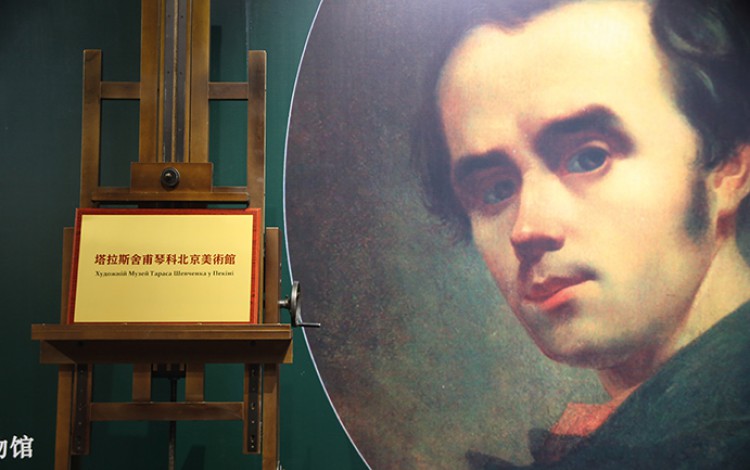 Ukrainian bard Taras Shevchenko unites Ukraine and China in landmark cultural exchange programme that paves way for closer bilateral ties. In 2016, a landmark series of art exchanges took place between Ukraine and China. It culminated with the opening of the Taras Shevchenko Museum in Beijing in September 2016, the first institution of its kind to be funded fully by a foreign government and not the Ukrainian state or diaspora. Ukrainian bard Taras Shevchenko unites Ukraine and China in landmark cultural exchange programme that paves way for closer bilateral ties. In 2016, a landmark series of art exchanges took place between Ukraine and China. It culminated with the opening of the Taras Shevchenko Museum in Beijing in September 2016, the first institution of its kind to be funded fully by a foreign government and not the Ukrainian state or diaspora.
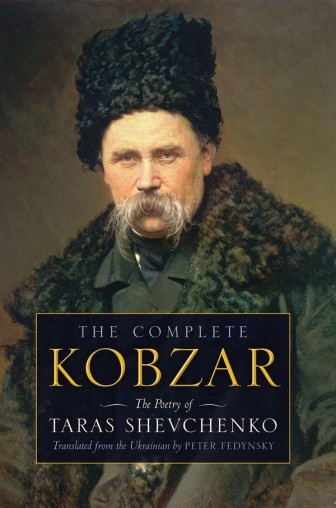 Upon learning of the English-language publication of “The Complete Kobzar” by Peter Fedynsky, one could reasonably ask: do we really need another English language translation of Shevchenko’s poems? The answer is a resounding yes! For two reasons. The first is that this is the first English translation of the “Kobzar” in its entirety. The second reason is articulated by Prof. Michael M. Naydan in his introduction (“A Kobzar for a New Millennium”) to the book: “to convey the poet’s verse in a modern English idiom that could be easily understood by readers of today.” Upon learning of the English-language publication of “The Complete Kobzar” by Peter Fedynsky, one could reasonably ask: do we really need another English language translation of Shevchenko’s poems? The answer is a resounding yes! For two reasons. The first is that this is the first English translation of the “Kobzar” in its entirety. The second reason is articulated by Prof. Michael M. Naydan in his introduction (“A Kobzar for a New Millennium”) to the book: “to convey the poet’s verse in a modern English idiom that could be easily understood by readers of today.”
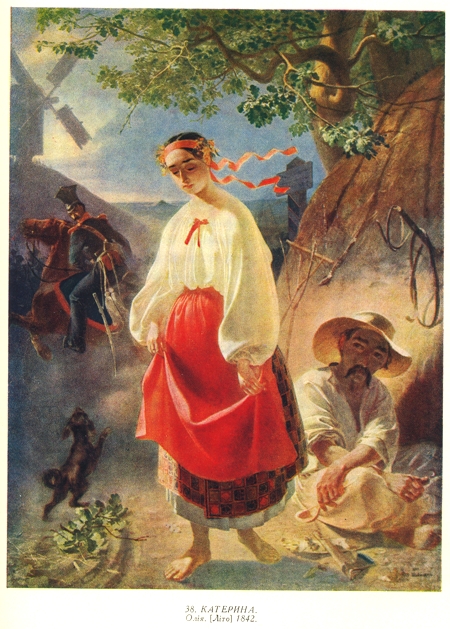 Taras Shevchenko wrote "Katerina" in 1838, in St. Petersburg, when he was 24 years old. It was in the same year that he was bought out of serfdom from Baron Englehardt by a group of St. Petersburg artists and intellectuals. This poem is dedicated to the Russian writer Zhukovsky, who posed for Karl Bryullov, the leading artist of the time. The portrait was sold for 2,500 rubles, to raise the purchase price of Taras Shevchenko’s freedom. The poem “Katerina” was first printed in the 1840 edition of “Kobzar”, and many of the passages were censored. In it, Shevchenko brings out the life of the serfs of that period, the status of women, and expresses his hatred of the tsarist regime which kept Ukraine in bondage. Taras Shevchenko wrote "Katerina" in 1838, in St. Petersburg, when he was 24 years old. It was in the same year that he was bought out of serfdom from Baron Englehardt by a group of St. Petersburg artists and intellectuals. This poem is dedicated to the Russian writer Zhukovsky, who posed for Karl Bryullov, the leading artist of the time. The portrait was sold for 2,500 rubles, to raise the purchase price of Taras Shevchenko’s freedom. The poem “Katerina” was first printed in the 1840 edition of “Kobzar”, and many of the passages were censored. In it, Shevchenko brings out the life of the serfs of that period, the status of women, and expresses his hatred of the tsarist regime which kept Ukraine in bondage.
Poem of Taras Shevchenko
"Chy ne pokynut' nam, neboho"
("Чи не покинуть нам, небого")
1861, St. Petersburg, (С. - Петербург)
Taras Shevchenko's poem
"Yakos'-to yduchy unochi"
("Якось-то йдучи уночі")
1860, St. Petersburg, (С. - Петербург)
Poem of Taras Shevchenko
"I den' ide, i nich ide"
("І день іде, і ніч іде")
1860, St. Petersburg, (С. - Петербург)
Poem of Taras Shevchenko
"Oy dibrovo - temnyy hayu!"
("Ой діброво - темний гаю!")
1860, St. Petersburg, (С. - Петербург)
Poem of Taras Shevchenko
"Ohni horiat, muzyka hraie"
("Огні горять, музика грає")
1850, Orenburg, (Оренбург)
Taras Shevchenko's poem
"Za sontsem khmaronka plyve"
("За сонцем хмаронька пливе")
1849, Kos-Aral, (Косарал)
Taras Shevchenko's poem
"I znov meni ne pryvezla"
("І знов мені не привезла")
1848, Kos-Aral, (Косарал)
|
|
|
|
|
|